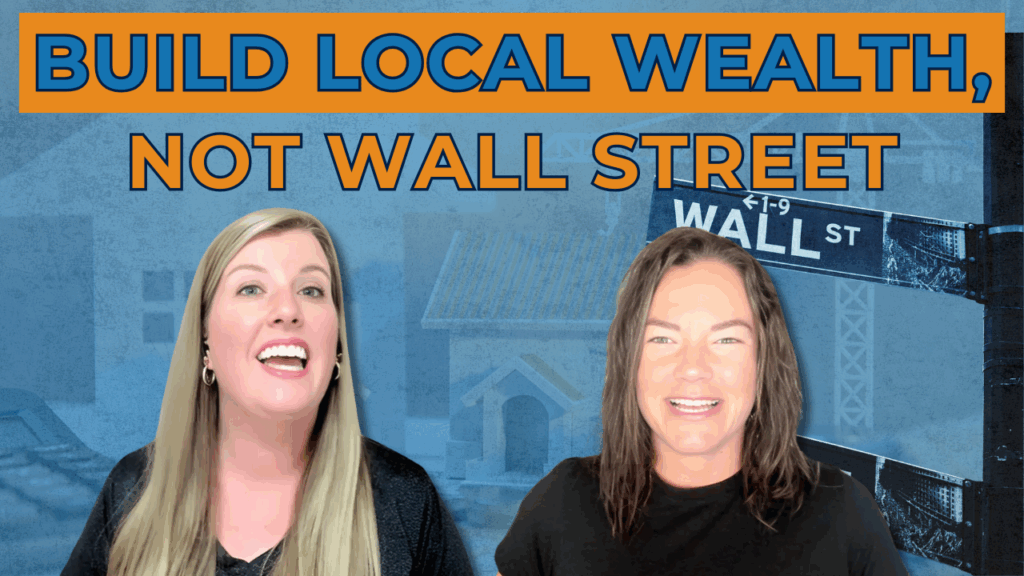
What does it really take to transition from total beginner to a seasoned developer leading $450M+ in projects? In this episode, I sit down with Kristi Kandel, who shares her candid and inspiring journey from working in signage to transforming communities through intentional development. You’ll learn how to overcome fear, build systems, and develop properties that bring real value—plus how small-town developers can create massive impact. Whether you’re new to real estate or looking to scale your investing strategy, this conversation is packed with real-world insight, heartfelt moments, and the exact mindset it takes to lead in development. Don’t miss Kristi’s blueprint for success.
For a complete guide on optimizing and scaling your real estate investments, download my Freedom Blueprint! This essential tool walks you through ten key steps for organizing a profitable property portfolio. Click here to get your copy today!
Hello everyone and welcome back. I’m Adrienne Green and today I have with me Kristi Kandel. Get ready for insights to help you scale, systemize, and create more freedom. Let’s jump in. So thank you so much for being here with me, Kristi.
Thanks for having me.
Now, my understanding, Kristi, is that you are on a mission to put real estate development back in the hands of the people who live, work, and invest in their communities. It sounds like you have over 20 years of experience and $450 million in projects done with major brands like Chick-fil-A and CVS. Now, I know you’re doing all these great things now, and I’m excited to hear about them. And yet, I’d love us to start at the beginning. How did you get here?
Well, the journey started in a small town in Ohio. After college, I ended up moving to Florida and started working with a sign company who was putting up signs for CVS Pharmacy. And growing up, we didn’t have a lot of money. Owning a house that you lived in wasn’t even on my mind. So I never thought about real estate. I never thought about how communities are formed. And now I’m in this job where I’m putting up signs for these new CVS that are being built and the shopping centers around them. And I’m starting to realize, my gosh. This is how our communities are formed.
So after working with about six different developers at the time in Florida, it became very clear who the leading group was. I was in the field one day and I was like, “Hey, Eric, what’s it take to be a developer?” And he said something that changed my life. I thought he was going to say, go to school, do this, do that. But he said, “We just want the right people with the right work ethics, the right personalities, the right fit. We’ll teach you the business.” I said, “Cool. When are you hiring me?” And three weeks later, I ended up joining their company.
They were working in Florida, Georgia, and Alabama. This was right around 2009 when the economy had tanked. Family Dollar called and said, “Hey, we want to expand to California.” They didn’t have any locations there and our company wasn’t in California yet. Two of the guys had done developments in California previously, so they were out doing market research. I got the call to help do sign and landscape code research. I worked during the day on the East Coast projects and then at night on the California opportunity. I just knew that if I got the chance to go help open that market, it would bring a lot of opportunity.
By December 2010, I was the front runner to relocate to California because I didn’t have a spouse or kids. I was the lowest risk. So I moved out there in June 2010, and for the next four years, from San Francisco to San Diego, we developed 30 Family Dollars a year. I handled due diligence, hired architects and engineers, managed entitlements, planning commission, city council meetings, permitting, and construction management—all in my early twenties.
I had a mentor with 30 years in the industry. She said, “Kristi, you’ve gotten a 30-year career’s worth of experience in four years.” That made me realize I could use that experience. But I still wanted to learn more—what about shopping centers, industrial, multifamily? So I joined a developer in Newport Beach who did all of that. I quickly saw that it’s all the same steps. You just ask different questions. Bigger deals mean more time and more money.
In 2015, I finally started my own company. Now, a decade in, I’ve built teams, systems, processes, software, and I’ve started investing in my own smaller multifamily deals in Nevada, Ohio, and Florida. A lot of businesses have spun out from that. All of this came from a girl in Ohio moving to Florida and letting the universe do its magic.
And having the courage and ambition to ask, “What does it take?” and then taking that step, even when it was scary, right?
Yeah, completely. My family jokes that the world used to be my comfort zone, now it’s the universe. It’s not that I don’t feel fear. I feel it, but I don’t let it stop me. Whenever I feel nervous, I get excited because I know I’m about to grow.
That’s such a great way to look at it. But it probably took years to develop that mindset. So, if you’re talking to someone at the beginning of that journey, still scared, anxious, unsure—what would you say to help them take that next step?
I like to think about the worst-case scenario. What is the absolute worst that can happen? When I left my six-figure job in Southern California, I bought an SUV and said, “The worst thing that happens is I become homeless and sleep in the back of this Nissan Rogue.” None of my friends would’ve let me be homeless, but that was my worst-case. And even today, that’s my biggest fear—going back to a W-2 job. Once you realize you won’t be maimed or die, it’s liberating. And when you make a decision, it’s not forever. You can course-correct as you gain more information.
Such a great point. A lot of people hear “development” and get scared. Can you explain why someone might want to go into development?
There are over 19,500 cities with permitting departments in the U.S. Over 75% have populations under 10,000. So most development isn’t New York or San Francisco-size projects. If you can flip a house, you can flip a commercial building. As a developer, you’re figuring out the highest and best use for a property. In your own town, you know what’s missing—maybe it’s a daycare or a coffee shop. You’re the best person to fill that need and build something that serves you and your community. That’s what makes development so exciting.
What holds people back from doing it?
The top three fears: being overwhelmed, not knowing where to start, and not knowing how to be taken seriously. Here’s what I tell people: start by finding a mentor or someone already doing this in your town. Build relationships with your broker, lender, architect, engineer, and contractor. Those are your five key partners. Once you start putting in effort, you’ll be surprised how willing people are to share knowledge. And don’t worry about not having a million dollars. Most deals in smaller towns need $100K to $300K, and you can leverage regional bank debt and investors. Big developers rarely use their own money.
Also, you get more time and bigger returns. It’s not about going it alone—you build a team. And once you do, it’s more fun and more profitable.
That’s a great breakdown of the how. But nothing’s perfect. What are the real challenges of development?
The project you start isn’t the one you finish. Development is like unpeeling an onion. You deal with zoning codes, utilities, and sometimes difficult neighbors. Cities want to work with you, but there will always be setbacks. You may need to add $25K for curb appeal or run into surprises like water rights issues in California. I’ve seen developers already under construction who didn’t even have rights to water. Development isn’t done in a straight line—it’s done in phases. You make progress, stop, assess, adjust, and continue.
It’s not black and white, and that’s what makes it fun for people who like solving problems. If that’s you, development is your game. If not, maybe you’re better suited to manage the property or operate the business afterward.
Let’s talk about timelines. Development seems to take longer. How should investors think about the time investment?
There’s no instant gratification in development. It’s why I got good at snowboarding and beach volleyball. Flipping a house might take 3-6 months. Development is 18-36 months. Yes, you can work a W-2 while developing. There are long pauses between city comments, bids, and phases. Once your pipeline is built, you’re rolling. Then you hold the property for 7-10 years to maximize returns. You’ll also spark revitalization in your community, improve property values, and build lasting relationships.
That’s one of the best things about real estate—you’re helping Main Street, not Wall Street. Local developers create a better community vibe.
Exactly. When locals own and operate developments, we care more. We care about the customer experience and the people. We create jobs, upgrade utilities, improve the local economy—and that’s way more sustainable.
Can you talk about the strategies or systems that helped you scale your business?
Development is an old industry. Most people still use emails and spreadsheets. When I started my company, I became the knowledge bottleneck. So in 2020, I built software to manage our development projects—step-by-step, task-by-task. It helped onboard new project managers in four months instead of two years. Each task included instructions, draft emails, examples, links—everything. It empowered my team to focus on the project instead of reinventing the wheel. That was a game changer.
For those who say “It’s faster if I just do it myself,” what’s your response?
You have to invest a little more time upfront if you want to succeed and avoid burnout. In 2020, I worked 12-hour days while being a planning commissioner and traveling in a truck camper. My sister thought I was insane. But I said, “This sacrifice is for the future.” A year later, I was relaxing at her house, working a few hours a day, because I’d built systems and hired key people. Now I don’t know how I ever managed it all before. You have more time than you think. Stop reacting, start planning, and time-block for what matters.
That’s incredibly powerful advice. Final quickfire questions: What is one transformational system that’s changed your business?
Definitely the software we built. It’s now our CRM and operating system for everything—from buying businesses to managing properties. It empowered our team, improved consistency, and built a strong culture.
And what’s a transformational book you recommend?
“Who Not How” by Dan Sullivan and Benjamin Hardy. It shifted how I build teams and delegate. It taught me to focus on my strengths and hire people for what drains me. Everyone gets to operate in their zone of genius.
If someone wants to learn more or connect with you, where should they go?
If you’re curious about development, go to localrealestatedeveloper.com. You’ll find my blueprint course, masterclass, and mentorship program. If you want to learn more about me and my story, visit KristiKandel.com. You’ll find my book, favorite podcasts, and more.
Thank you so much, Kristi. This has been such a rich and valuable conversation. For those listening, if you found this helpful, please subscribe, leave a review, and share this with someone who could benefit from Kristi’s story. You’re not just building properties—you’re building a life of freedom. See you next time.
